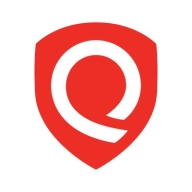

Qualys Web Application Scanning and GitLab both serve distinctive roles in the tech industry, with Qualys focusing on vulnerability management and GitLab excelling in enhancement of the development lifecycle through CI/CD pipeline management. Based on the feature comparison, Qualys has a slight edge due to its comprehensive vulnerability scanning capabilities.
Features: Qualys Web Application Scanning provides crucial features such as Selenium IDE integration, protection against zero-day vulnerabilities, and comprehensive OWASP Top 10 scanning capabilities. It is cloud-based, aiding deployment and scalability, and offers an integrated dashboard for extensive reporting. GitLab, on the other hand, excels with its CI/CD pipeline management, seamless integration with other tools, and robust repository management, which are crucial for DevOps environments.
Room for Improvement: Qualys WAS could reduce false positives, improve API integration, and enhance business logic vulnerability detection. Its pricing model and user interface are areas of potential refinement. GitLab, meanwhile, could enhance AWS integration, improve compatibility with third-party project management tools, and expand features for automated peer review and security testing.
Ease of Deployment and Customer Service: Qualys WAS provides flexible deployment options across various cloud models, beneficial for a scalable and manageable solution. However, user feedback on Qualys' technical support varies, highlighting a need for a more proactive approach. GitLab supports diverse deployment environments as well and is praised for its strong customer support.
Pricing and ROI: Qualys WAS' licensing costs can be prohibitive for smaller teams, with pricing based on asset counts and extra services, though users report good ROI. GitLab offers a free version but its premium editions are costly, yet seen as providing good value for larger teams due to its comprehensive feature set. Budget considerations for these products depend heavily on team size and requirements.
Migrating to GitLab is bringing time-saving benefits, and everything is easier to automate.
We have saved time significantly, reducing deployment time from four hours to five minutes per deployment.
We have rarely needed to escalate issues to technical support since GitLab usually runs seamlessly.
I have interacted with architects for some advice during the implementation, and they were prompt in their response.
I have had meetings where they taught me, explained things, and provided guidance for starting from scratch.
Once we purchase the license, we have access to top-notch support.
I have dealt with Qualys's technical support, and any enhancements are challenging.
It has all the features required for our coding and deployment needs, which makes it scalable to our changing requirements.
We're transitioning to OpenShift for future scalability with increased user numbers.
For scaling, other deployment options from GitLab's side need to be adopted.
It is licensed for assets, so we just contact the team for additional licenses if needed.
At one point, there was a limitation on reporting for 100,000 assets at a time.
I have not encountered any performance or stability issues with GitLab so far.
The updates are frequent and demanding, happening at least once a week due to security reasons.
It would be beneficial to have a user-friendly interface for setting up these configurations, instead of just writing YAML files.
It is essential to conduct proper testing, such as unit tests and code coverage, within the SDLC pipelines.
GitLab can improve its user interface to make conflict resolution more user-friendly.
With the growing reliance on AI, Qualys Web Application Scanning should be updated to handle AI-based applications and LLM-based attacks.
I would like it to be cheaper because it is a bit expensive compared to competitors like Tenable Nessus.
One area of improvement is reducing false positives by prioritizing agent findings over remote findings when there is a corresponding local agent finding.
Even when working in other small organizations, we opted for GitLab as it was cost-efficient.
The pricing of GitLab is reasonable, aligning with what I consider to be average compared to competitors.
The price is high, and it limits user accessibility.
They offer discounts on bulk licenses, making it cheaper compared to competitors like Veracode DAST.
I find it a bit expensive compared to other competitors.
As we implement automated testing and DevSecOps, it speeds up the process by forty to sixty percent.
The Ultimate version offers enhanced features for security scanning through DAST and SAST analysis, which have greatly benefitted our project workflow.
By integrating GitLab as a DevOps platform, we have enhanced agility, improved our time to market, and different teams can work collaboratively on various projects.
It effectively detects vulnerabilities like the OWASP Top 10 without any issues in reporting.
Credential scanning is very effective because it goes in-depth into the system, crawling the pages, and reporting on vulnerabilities.
Qualys Web Application Scanning is accurate and provides minimal false positives.


GitLab is a complete DevOps platform that enables teams to collaborate and deliver software faster.
It provides a single application for the entire DevOps lifecycle, from planning and development to testing, deployment, and monitoring.
With GitLab, teams can streamline their workflows, automate processes, and improve productivity.
Qualys Web Application Scanning (WAS) is a fully cloud-based web application security scanner. The scanner will automatically crawl periodically and test web applications to discover potential vulnerabilities, including cross-site scripting (XSS) and SQL injection. The consistent testing equips the automated service to generate consistent results, lessen false positives, and offer the ability to scale to protect thousands of websites effortlessly.
Qualys Web Application Scanning is bundled with different scanning technology to carefully scan websites for malware infections and will send notifications to website owners to assist in preventing blacklisting and brand reputation damage. As digital transformation takes place in various organizations, Qualys WAS gives organizations the ability to track and document their web app security status through its interactive reporting capabilities.
Qualys WAS empowers organizations to remediate any web application vulnerabilities quickly. Some of the key tools offered are:
Benefits of Qualys Web Application Scanning
Qualys Web Application Scanning offers many benefits, including:
Reviews from Real Users
Qualys Web Application Scanning stands out among its competitors for a variety of reasons. Two of those reasons are its progressive scan and quick detection of vulnerabilities.
P.K., a senior software developer at a tech vendor, writes, "The feature that I have found most valuable is the progressive scan. It is good. It's done in 24 hours."
Nagaraj S., lead cybersecurity engineer at a tech service company, notes, "I have found the detection of vulnerabilities tool thorough with good results and the graphical display output to be wonderful and full of colors. It allows many types of outputs, such as bar and chart previews."
We monitor all Application Security Tools reviews to prevent fraudulent reviews and keep review quality high. We do not post reviews by company employees or direct competitors. We validate each review for authenticity via cross-reference with LinkedIn, and personal follow-up with the reviewer when necessary.